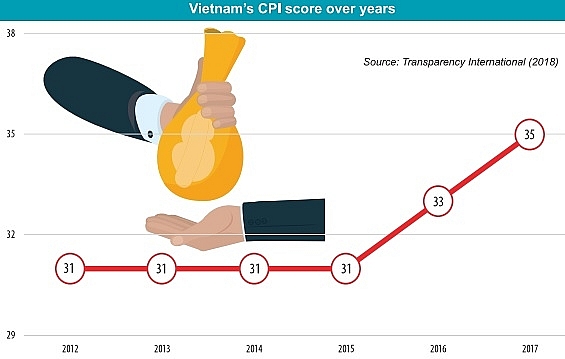Corruption perception improves
 |
The Berlin-headquartered Transparency International (TI) last week released its Corruption Perceptions Index (CPI) 2017, ranking 180 countries and territories based on how corrupt their public sector is perceived to be, as determined by opinions and assessments of experts and business people.
Vietnam scored 35 points out of 100 on the CPI 2017, ranking 107th out of 180 countries surveyed. This is up two points from the CPI 2016 and four points from the CPI 2015.
According to the Towards Transparency, which is TI’s official National Contact in Vietnam, the slight increase in Vietnam’s CPI score for two consecutive years (in 2016 and 2017) is “indicative of a positive signal for its anti-corruption efforts in recent years.”
“In 2017, with the renewed commitments of the Party and the state, the national anti-corruption efforts have achieved some positive results, including the adjudication of serious corruption cases involving several high-level public officials,” Nguyen Thi Kieu Vien, executive director of Towards Transparency, told VIR. “At the same time, Vietnam has continued to improve its anti-corruption legal framework. One example of this is the recent revision of the existing Law on Anti-corruption to accord with international standards.”
Party General Secretary Nguyen Phu Trong and Prime Minister Nguyen Xuan Phuc have always stressed that investigations over large complicated corruption and embezzlement cases will continue in 2018, building on the investigations conducted in 2017.
“All violators will be punished. Many cases have been strictly investigated and prosecuted under the regulations of the Party and the state’s law, including violators that are high-level leaders of the Party, both currently working and retired,” said Trong during a recent government-led socio-economic development conference with localities throughout Vietnam.
Last month, Hanoi’s People’s Court concluded the case of “intentionally violating the state regulations on economic management and causing grave aftermath, and asset embezzlement” at state-run PetroVietnam and its PetroVietnam Construction Joint Stock Corporation (PVC).
Under the court’s final verdict, 22 former executives received severe punishments. PetroVietnam’s former chairman Dinh La Thang earned 13 years in jail and PVC’s former chairman Trinh Xuan Thanh received a life sentence.
Notably, Thang is a former Politburo member (January 2016 to May 2017), former vice head of the Central Economic Committee (May to early December 2017), former Minister of Transport (2011 to 2016), former National Assembly member (10 years), and former Party Secretary of Ho Chi Minh City’s Party Committee (February 2016 to May 2017). He is also former secretary of the Party Committee and former chairman of PVN (2005 to 2011).
According to the investigators, Thang, together with many other PetroVietnam executives, caused a VND800 billion ($36.36 million) loss to the state budget by contributing capital to OceanBank, and violated state regulations on economic management at PVC relating to the Thai Binh 2 thermal power plant project.
TI said that the energy sector in Vietnam is one of the sectors most prone to corruption.
“Overall, the energy sector in Vietnam is affected by weak governance due to a lack of transparency, few checks and balances, bureaucracy, and close ties between government and businesses,” TI stated in a document. “With the Vietnamese government planning to attract more investment and donor money to guarantee energy security, it has made increasing efforts to tackle corruption, which have failed to cause significant improvements.”
According to TI, an increasingly vibrant civil society and a growing social media realm exerts pressure on the government to continue its path of anti-corruption policies. In the area of international budget aid, there are concerns that large infrastructure projects and public-private partnerships will increase the risk of corruption and will be subject to corrupt practices. There are also concerns with regard to investment in renewable energy, an area in which the corruption risks remain to be seen.
What the stars mean:
★ Poor ★ ★ Promising ★★★ Good ★★★★ Very good ★★★★★ Exceptional
Related Contents
Latest News
More News
- Foreign fruits flood Vietnamese market (December 09, 2025 | 13:22)
- Vietnam’s fruit and vegetable exports reach $7.8 billion in first 11 months (December 05, 2025 | 13:50)
- Vietnam shapes next-generation carbon market (November 26, 2025 | 15:33)
- PM urges Ho Chi Minh City to innovate and remain Vietnam’s economic locomotive (November 26, 2025 | 15:29)
- Experts chart Vietnam's digital finance path: high hopes, high stakes (November 14, 2025 | 10:56)
- Vietnam’s seafood imports surge 30 per cent in first 10 months (November 10, 2025 | 19:35)
- Vietnam’s durian exports hit $1 billion milestone (October 30, 2025 | 17:41)
- Beyond borders: Sunhouse and new era of Vietnamese brands on Amazon (October 28, 2025 | 10:46)
- Record-breaking trade fair set to open in Hanoi (October 15, 2025 | 15:59)
- Timber sector seeks solutions to VAT refunds (October 14, 2025 | 18:58)

 Tag:
Tag:


















 Mobile Version
Mobile Version